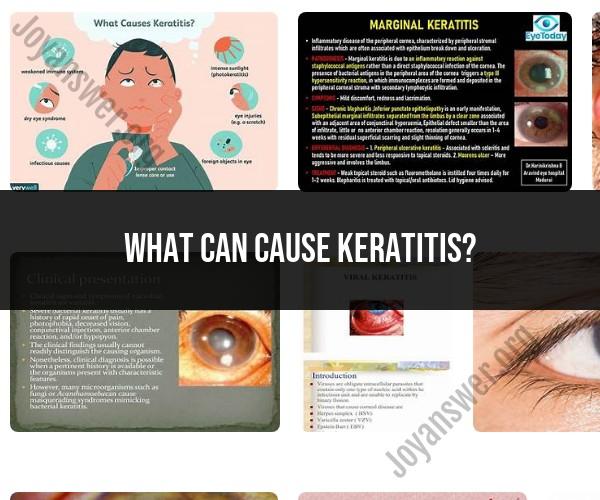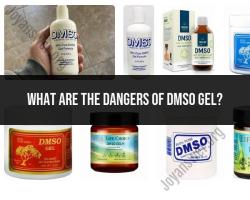What can cause keratitis?
Keratitis is the medical term for inflammation of the cornea, which is the clear, dome-shaped front surface of the eye. Keratitis can be caused by a variety of factors, including infectious and non-infectious causes. Here are some common causes of keratitis:
Infectious Causes:
Bacterial Infection: Bacterial keratitis can occur when bacteria, such as Staphylococcus or Pseudomonas, invade the cornea. This is often associated with contact lens wear, especially when proper hygiene practices are not followed.
Viral Infection: Viral keratitis can result from infections with viruses like herpes simplex virus (HSV) or varicella-zoster virus (VZV). These infections can lead to conditions like herpetic keratitis, which may recur and cause corneal inflammation.
Fungal Infection: Fungal keratitis is relatively rare but can be caused by fungi like Fusarium or Aspergillus. It is often associated with trauma or the use of contaminated contact lens solutions.
Protozoal Infection: Acanthamoeba keratitis is caused by the amoeba Acanthamoeba and is most commonly associated with contact lens use, particularly when water exposure is involved.
Non-Infectious Causes:
Contact Lens-Related Factors: Prolonged contact lens wear, poor hygiene, and using contact lenses in a way not recommended by an eye care professional can increase the risk of developing keratitis.
Corneal Injury or Trauma: Any injury to the cornea, such as scratches, cuts, or foreign bodies, can lead to keratitis. Trauma can disrupt the corneal epithelium and create an entry point for infections.
Dry Eye Syndrome: Insufficient tear production or poor tear quality can lead to corneal dryness and damage, increasing the risk of non-infectious keratitis.
Allergies: Allergic reactions to allergens like pollen, dust, or certain medications can cause eye inflammation, which may lead to keratitis in some cases.
Autoimmune Diseases: Conditions like autoimmune keratitis can result from the body's immune system attacking the cornea. This can occur in individuals with autoimmune diseases like rheumatoid arthritis or lupus.
Chemical Exposure: Exposure to chemicals, including household cleaning products or industrial chemicals, can lead to chemical keratitis. It's essential to flush the eye with clean water immediately if exposed to chemicals.
Ultraviolet (UV) Radiation: Chronic exposure to UV radiation from the sun or tanning beds can cause a form of keratitis called photokeratitis.
Underlying Eye Conditions: Some eye conditions, such as corneal dystrophies or corneal scarring, may predispose individuals to keratitis.
It's important to note that keratitis can lead to significant eye discomfort, pain, and vision problems if not promptly diagnosed and treated. If you suspect you have keratitis or experience eye symptoms like pain, redness, sensitivity to light, blurred vision, or discharge, it's crucial to seek immediate medical attention from an eye care professional. The underlying cause of keratitis will be determined through a thorough eye examination, and treatment will depend on the specific cause.
Causes of Keratitis: Exploring Eye Infection Triggers
Keratitis is an inflammation of the cornea, the clear, dome-shaped tissue at the front of the eye. It can be caused by a variety of factors, including:
- Infection: The most common cause of keratitis is infection. Bacteria, viruses, fungi, and parasites can all cause keratitis.
- Injury: A scratch or other injury to the cornea can also lead to keratitis.
- Dry eyes: Dry eyes can make the cornea more susceptible to infection and inflammation.
- Contact lens wear: Contact lens wearers are at an increased risk of keratitis, especially if they do not clean and care for their contact lenses properly.
- Other medical conditions: Certain medical conditions, such as rheumatoid arthritis and lupus, can increase the risk of keratitis.
Understanding the Factors Behind Keratitis
Some people are more at risk of developing keratitis than others. Risk factors for keratitis include:
- Contact lens wear: Contact lens wearers are at an increased risk of keratitis, especially if they do not clean and care for their contact lenses properly.
- Dry eyes: Dry eyes can make the cornea more susceptible to infection and inflammation.
- Weakened immune system: People with weakened immune systems, such as those with HIV/AIDS or cancer, are at an increased risk of keratitis.
- Other medical conditions: Certain medical conditions, such as rheumatoid arthritis and lupus, can increase the risk of keratitis.
Preventive Measures and Care for Eye Health
There are a number of things you can do to help prevent keratitis, including:
- Wash your hands often. This will help to reduce the risk of spreading bacteria to your eyes.
- Clean and care for your contact lenses properly. Be sure to follow the manufacturer's instructions for cleaning and disinfecting your contact lenses.
- Use artificial tears if your eyes are dry. Artificial tears can help to lubricate your eyes and reduce the risk of keratitis.
- See an eye doctor for regular checkups. Eye doctors can check for signs of keratitis and other eye problems.
Diagnosing and Treating Keratitis Effectively
If you think you may have keratitis, it is important to see an eye doctor right away. Keratitis can be diagnosed with a slit-lamp exam, which is a magnified view of the eye.
Treatment for keratitis will vary depending on the cause. If the keratitis is caused by an infection, your eye doctor may prescribe antibiotics, antiviral medication, or antifungal medication. If the keratitis is caused by dry eyes, your eye doctor may prescribe artificial tears or other medications to help lubricate your eyes.
In some cases, keratitis may require surgery to repair the cornea.
Real-Life Stories of Coping with Keratitis
Keratitis can be a challenging condition to cope with. However, with proper treatment, most people make a full recovery.
Here is a real-life story of someone who coped with keratitis:
"I was diagnosed with keratitis when I was 15 years old. It was a scary time for me, but I was grateful to have a supportive family and friends. I underwent surgery to repair my cornea, and I am now doing well. I still have to be careful with my eyes, but I am able to live a normal life."
If you or someone you know is living with keratitis, please know that you are not alone. There are many resources available to help you cope with the challenges of this condition.













